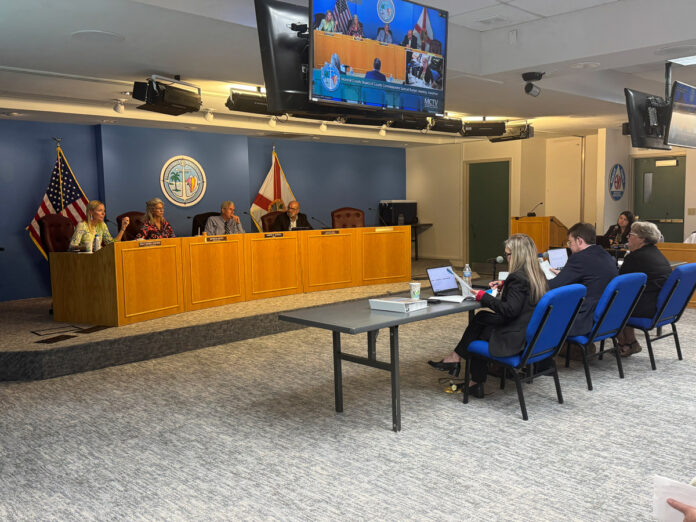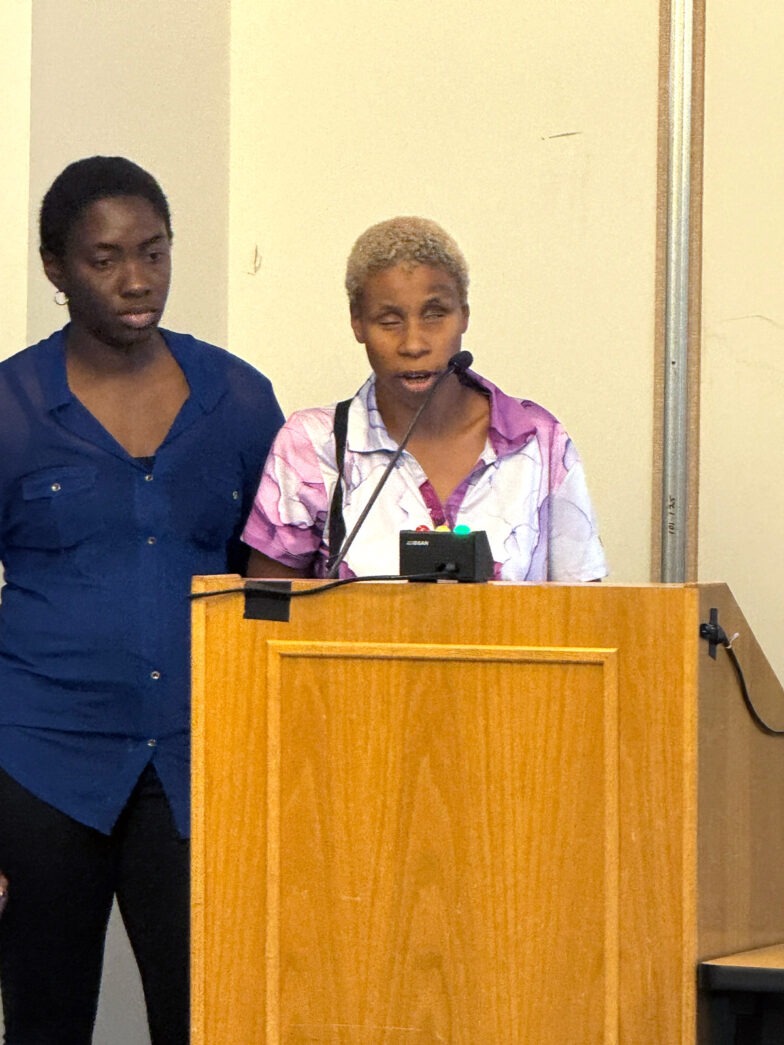
Facing mounting scrutiny from the state Department of Government Efficiency (DOGE) and uncertainty in future federal disaster assistance, the Monroe County Board of County Commissioners may look to a tax increase to build its emergency reserves.
But roughly 20 staff layoffs remain in effect, along with elimination of 20 extra vacant positions. And barring future changes, social service nonprofits will still see a sudden 50% reduction in county funding.
In a preliminary meeting lasting more than four hours on July 15, commissioners elected to set a county-wide maximum millage rate of 2.7327, or $273.27 per $100,000 in taxable home value, up from 2.6929 in 2024-25. If preserved, the new rate would represent a 10.25% increase over the rollback rate of 2.4786 – the millage rate that would generate the same amount of property tax revenue as 2024-25, based on increased county-wide property values. Those values jumped 9.3% in 2025 to a total taxable value of $50.2 billion, up from $46 billion in 2024.
Since January, county officials have received increasingly detailed probes from Florida’s DOGE to outline and categorize all aspects of government spending. What began as an initial check-in in March, County Administrator Christine Hurley told the commission, soon spread to comprehensive audits sent down in June and July – including all spending records, job descriptions and even hours worked by staff, among other items.
Last month, a presentation by DOGE team lead Eric Soskin to the Florida Association of Counties outlined the department’s priorities, including pinpointing “trendy or low-ROI” spending along with “unnecessary use of taxpayer funds to support (non-governmental organizations)” and “subsidized competition with private enterprises.”
That same month, software, data and media company Bloomberg reported a leaked federal memo titled “Abolishing FEMA.” It detailed plans by the Trump administration to “drastically shrink” the agency’s key disaster-response functions, including stopping federal aid to disasters that aren’t of “national significance” and stopping new enrollments in the National Flood Insurance Program.
Those developments, combined with looming state efforts to eliminate property taxes, guided the proposed $678.5 million budget presented Tuesday, which begins a march toward a $40 million emergency/disaster reserve fund should federal assistance be slashed.
But the reductions came at a hefty cost.
In early July, 20 county staffers ranging from executive assistants to senior environmental planners, mechanics and even the executive director of transit were told their positions would be eliminated by October at the latest. Seventeen vacant posts also got the axe.
Shortly before Tuesday’s meeting, local nonprofits funded by the county’s Human Services Advisory Board (HSAB) also learned they’d be taking a 50% cut – a $1.1 million hit for organizations like Key West’s MARC House and Samuel’s House, Keys AHEC and Womankind, among many others.
“These cuts have already been made, and it’s the only way we could balance the budget,” said Hurley, separating positions and funding already eliminated in staff’s proposed budget – dubbed Tier 1 and Tier 2 – from a Tier 3 “red plan” debated by the commission on Tuesday. If followed in full, that “red plan” would have included a complete cut to nonprofit funding, along with an additional 12 filled staff positions and seven vacant jobs.
“The further cuts are what we can accomplish to add money into the emergency reserves,” Hurley said.
An hour of public comment saw passionate pleas to restore HSAB funding and the Monroe County Extension Service. Several speakers said they would gladly accept a tax increase to continue supporting the affected groups.
“I’m deaf, blind and have multiple disabilities,” Key West resident Tosha Snyder told the commission. “Through no fault of my own, I lost my home, I lost my life, I lost everything. People from Samuel’s House, when I knocked on the door, they let me in. … I just urge you to please leave the door open. There are so many people who are just sitting there asking, ‘Is there a place for me?’”
“Eliminating this creates more need with less funds to go around,” said Key West resident Diana Flenard on behalf of the Monroe County Homeless Coalition and MARC House. “Who do you think, when there’s a hurricane and FEMA doesn’t come down, they’re going to reach out to when they need help with water, electric, their bills? They’re going to come back to these HSAB-funded organizations for help.”
“We are letting (non-homesteaded property owners) use our county for their playground, and touting it as a feather in our cap that we charge them low taxes,” said Womankind executive director Callie Roberts. “We’re saying, you can come down here one weekend a year, but this woman does not get prenatal care?
“You’re not raising taxes, you’re keeping up with the times. If you’re going to charge me an extra $200 a year to live here, I will gladly write you the check.”
All four commissioners present acknowledged the significance of the organizations, while commissioner David Rice argued for a 25% total cut to the HSAB funding, something he said most nonprofits “could survive.”

“They’re not receiving a dollar-for-dollar cut,” he said, adding that a 50% cut “will kill off” several human services nonprofits. “In many cases, that dollar buys them three dollars in matching (grants).”
“I no longer take pride in Monroe County having the lowest millage in the state of Florida,” he added. “I think what we’re doing is going to have an impact on our quality of life that we will only recognize too late.”
But commissioners Holly Raschein and Michelle Lincoln said they struggled with nonprofits’ reliance on government funding and what could be seen as mandated donations, preferring instead for residents to choose which organizations to support directly.
“Government funding is not necessarily a guarantee, and it’s certainly not an entitlement – it’s a bonus,” said Raschein, calling on her experiences with line item vetos in the state appropriations committee. “When you build your budget on government funding, you can never depend on that.”
“We all sit on these boards – we all do everything we humanly can to support every one of our not-for-profit agencies in our county,” said Lincoln. “In some years, more (organizations) have applied (to HSAB) than get money. We’re taking taxpayers’ money to decide which agencies we fund, and that puts all of us in a very tough spot.”
The four commissioners present, with Craig Cates absent, ultimately agreed to a plan that would add $4 million to the county’s $10 million in disaster reserves, made possible by pairing the raised millage with cuts to seven vacant positions in the Tier 3 “red” plan; removal of the county from the Southeast Florida Regional Climate Compact; elimination of FreeBee ride services in Key West and Stock Island; a complete funding cut to the Historic Florida Keys Foundation; and reducing proposed cost of living adjustments for the county’s constitutional officers from 5% to 2.9%, matching those of other staff members.
The proposed millage may be preserved or decreased, but not increased, at two public hearings on Sept 3 and 10, both at 5:05 p.m. at the Harvey Government Center in Key West and the Murray Nelson Government Center in Key Largo, respectively.
Studies over the summer will continue to explore cost-cutting measures, including analyzing expenses eligible for Tourist Development Council funding, analysis of the county’s Parks and Recreation summer camp, additional staffing evaluations and continued monitoring of federal legislation changes as well as state and local revenue estimates.
“Ultimately, we greatly appreciate not being eliminated totally, but it will require most agencies that care for our local residents to simply stop or significantly reduce services,” Keys AHEC CEO Michael Cunningham told the Weekly after the meeting. “Who will be able to fill that gap? This is why we all exist and have full patient caseloads.”

















